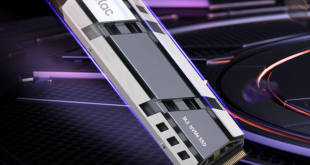Memory Overclocking:
A system’s maximum memory frequency is heavily related to the performance of an individual CPU’s memory controller. The motherboard’s performance can also help to obtain higher speeds, especially when XMP settings are taken into account.
We switched to a 2800MHz set of ADATA XPG V2 memory, as well as a single stick of G.Skill's 2933MHz Trident X F3-2933C12D-8GTXDG (for speed validation purposes), to test the performance of the Core i7 4960X CPU's integrated memory controller (IMC) and the Asus X79-Deluxe motherboard’s high-speed memory support.
We didn't expect the 4960X to be able to reach either set's maximum data rates (Haswell or extreme overclocking is required for that), but the high DRAM frequencies allowed us to move the speed bottleneck away from the memory and onto the CPU.
A 2400MHz DRAM frequency proved too easy for the IVB-E CPU's strong (and seemingly improved, in comparison to SB-E) IMC. Using the 1.00x CPU strap with a 100MHz base clock, 2400MHz was as far as we could go. Despite the motherboard offering higher dividers, none of them would reach POST, indicating that the 4960X's maximum (realistically-achievable) memory multiplier is 18x (100:133.3 * 18 = 2400MHz).
To reach 2400MHz, we did nothing more than manually configure the memory timings and voltage, before selecting the 2400MHz divider. No power tweaks or additional voltage parameters were changed.
After switching to the 1.25x CPU strap and using a 125MHz base clock, the 4960X CPU's IMC was able to push our memory sticks up to 2666MHz. Again, we didn't change any power settings or voltage parameters (other than a manually-set 1.65V DRAM voltage) to reach 2666MHz.
3000MHz (a speed which both kits are capable of with our loosened timings) proved a step too far for our IVB-E chip's IMC. Even tweaking the power settings and memory controller voltages had no affect on the system's inability to POST at a 3000MHz DRAM frequency.
Given that SB-E processors started to provide problems (and usually required voltage increases) when using memory speeds around the 2400MHz mark, IVB-E's ability to boot and hold stability with 2666MHz memory at its stock voltages is impressive. It's not Haswell-calibre memory support, but being able to easily use a 2666MHz DRAM frequency is a good improvement from what SB-E offered.
Our validation with the ADATA XPG V2 2800MHz memory running at 2666MHz with the Core i7 4960X EE processor can be viewed here.
 KitGuru KitGuru.net – Tech News | Hardware News | Hardware Reviews | IOS | Mobile | Gaming | Graphics Cards
KitGuru KitGuru.net – Tech News | Hardware News | Hardware Reviews | IOS | Mobile | Gaming | Graphics Cards






Epic stuff. skimmed over it before work this morning, bookmarked for a good read later today. Next on my list to place my 3930k.
Well at least it seems to overclock a bit better than Haswell. Good info on the core to core tests. 4770k is the most efficient processor on a core basis.
4960x looks like a solid processor, but I wish AMD could offer more of a challenge then Intel would be forced to drop their prices a little. it is very very expensive. Still, for the target audience of people who render etc looks like a great buy.
AMD , where are you!???
Great review, haven’t read all of it yet, but picked up some interesting info. Way out of my price range. im saving for a 4570k and a new mobo. always good reading these ultra high end reviews, just to dream !
wow a lot of work in this one. I do agree with eran earlier in the review. Intel are kick ass, but the prices are hard to swallow. 4770k for a bang to buck is much better, but same with the last generation. these 6 core CPU’s cost a small fortune.
Good work Mr Hill.
best review of this I have read today. I love INTEL!
Ah the perfect partner. Blows the heck out of the FX 9590.
Did ASUS provide a release date for the X79-Deluxe?
LqM, the Asus board will be hitting retailers in the coming days.
Asus would release more boards or just the deluxe?
I wont get the 4770k. 4820 is much better IMO
what are the boot times and boot options on the “Asus X79-Deluxe”?